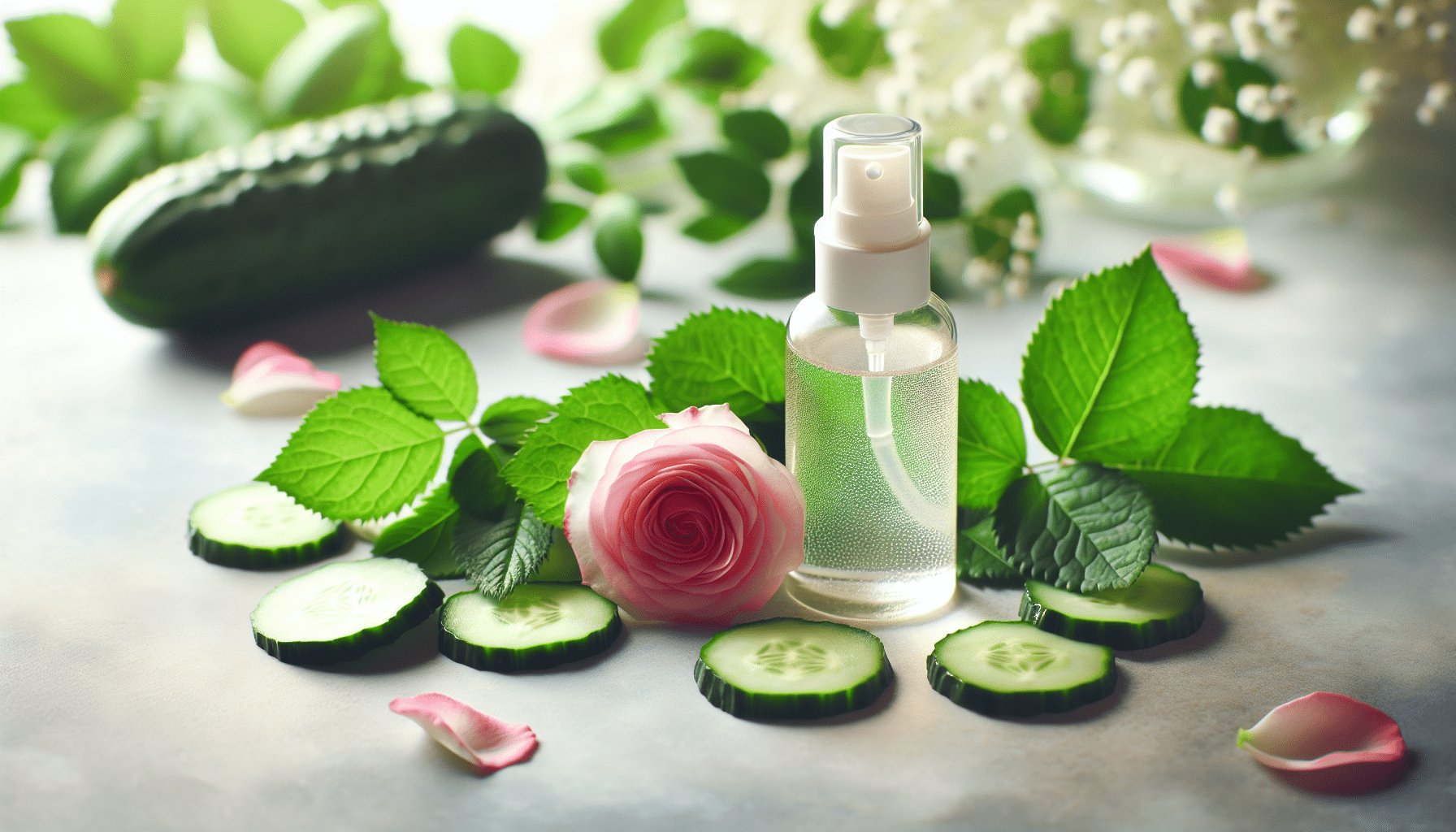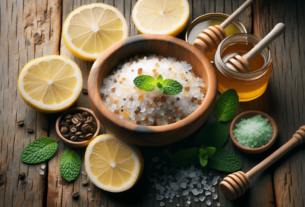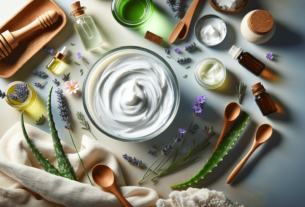Have you ever wondered how you might delve into the world of natural skincare by concocting your own toner at home? The notion of using homemade, natural products can be both appealing and empowering. You gain command over the ingredients you apply to your skin, ensuring they align with your values and skin needs. While the realm of skincare might sometimes seem daunting, understanding how to craft your own natural toner can be a delightful education in the balance of nature and personal care.

Understanding the Role of Toner in Skincare
Before immersing yourself into the creative process of making your natural toner, let’s take a moment to understand just what role a toner plays in skin care. Essentially, a toner typically acts as a bridge between cleansing and moisturizing, bringing balance and harmony to your skin. It helps to gently remove any leftover traces of oil or dirt after cleansing, while also restoring your skin’s natural pH level.
The Myth Busting
While some people might argue that toner is an unnecessary step in skincare, dismissing it entirely overlooks the benefits it might present. It’s all about figuring out what works for you, without getting swept away by over-hyped claims or negations. In essence, a well-formulated natural toner can impart hydration, soothe irritation, and even tighten pores, creating an overall more balanced complexion.
Exploring Ingredients for Your Natural Toner
Now that you have a grip on what a toner does, you might be eager to explore the vast world of natural ingredients that you can use. The beauty of making your own toner lies in understanding and selecting what each component can offer for your specific skin type or concern.
Understanding Different Skin Types
Before making any decisions, you ought to consider the type of skin you have. Is it oily, dry, sensitive, or perhaps a handsome blend known as combination skin? Recognizing your skin type can guide you in choosing ingredients that nurture rather than irritate.
Oily Skin
For oily skin, you might be seeking ingredients known for their astringent properties to help minimize the appearance of enlarged pores, such as witch hazel or apple cider vinegar. However, balance is key, as too many drying agents can overstimulate the skin, leading to overproduction of oil.
Dry Skin
Those with dry skin often crave hydration and moisture retention. Soothing agents like aloe vera, rose water, or chamomile can bring about a sense of relief to parched layers of skin, fostering an environment of happy hydration.
Sensitive Skin
Sensitive skin might propose a challenge, for it tends to react unpredictably. Look towards soothing heroes like green tea or cucumber, which are known for their calming effect, keeping irritation at bay.
Combination Skin
Combination skin requires some thoughtful balancing between dryness and oiliness. A mix of gentle astringents alongside hydrating ingredients can marry the two needs together lovingly, without overwhelming either part of the face.
Ingredient Functionality
Understanding the role each ingredient plays can make your crafting journey all the more intuitive. Let’s look deeper into a few versatile components that might make their way into your natural toner toolkit:
| Ingredient | Benefits |
|---|---|
| Witch Hazel | Natural astringent, helps tighten pores, reduces inflammation |
| Rose Water | Hydrating, soothing, assists in maintaining pH balance |
| Apple Cider Vinegar | Balancing pH levels, antibacterial properties |
| Green Tea | Antioxidant-rich, soothing, reduces irritation |
| Aloe Vera | Hydrating, soothing, promotes healing |
| Chamomile | Calmative, anti-inflammatory, ideal for sensitive skin |
| Cucumber | Refreshing, soothing, helps with puffiness and hydration |
The Crafting Process: Turning Ingredients into Your Natural Toner
With your selection in hand, it’s time to get a bit hands-on. Creating your toner can be a simple yet fulfilling endeavor, allowing creativity and self-care to intertwine.
Crafting Basic Recipes
For those just beginning, diving into basic recipes can provide a solid ground. Here, simplicity reigns, allowing the pureness of each ingredient to shine.
Witch Hazel and Rose Water Toner
Comprising only two ingredients, this toner is gentle on the skin yet effective:
- Ingredients: 1/2 cup of organic witch hazel, 1/2 cup of rose water
- Instructions: Mix the two liquids in a sterilized glass bottle. Shake well before each use. Apply using a cotton pad, gently sweeping across the face.
Green Tea and Aloe Vera Toner
Perfect for calming and hydrating:
- Ingredients: 1 cup of brewed green tea (cooled), 2 tbsp of aloe vera gel
- Instructions: Combine the cooled tea with aloe vera in a clean bottle. Ensure it is mixed thoroughly before applying to your face with a cotton ball.
Tailoring Recipes for Unique Needs
Exploration beckons as you grow more comfortable; adapting and experimenting with recipes might lead you to a toner that perfectly suits your unique needs.
Oily Skin Variation
For those dealing with excess oil, consider adding a few drops of tea tree essential oil to the basic witch hazel and rose water recipe. Tea tree oil is renowned for its natural antibacterial properties, which can prove beneficial for acne-prone skin.
Dry Skin Bliss
Enhance hydration for dry skin by adding glycerin to the green tea and aloe vera blend. A small amount, say about 1 tsp, can amplify the moisturizing effects without overwhelming the concoction.
Preservation and Usage Tips
Crafting naturally means erring on the side of freshness. These natural toners usually have a shorter shelf life compared to commercial products. Typically, you can expect a natural toner to last around one to two weeks when stored in the fridge, maintaining the integrity and effectiveness of the ingredients.
Moreover, daily use is generally safe. A morning ritual of applying toner post-cleansing can prep your skin beautifully for whichever version of the day you choose to explore, while an evening sweep can help remove any lingering impurities, ushering your skin towards tranquil rest.
Exploring the Benefits and Limitations of Natural Toners
Embarking on the all-natural path offers many benefits yet also brings along certain limitations. Understanding both can help elevate your skincare ritual with wisdom and mindfulness.
Advantages of Going Natural
When you use homemade natural toners, you are in a realm free from the myriad synthetic additives lurking in many commercial products. Natural toners provide:
- Control Over Ingredients: You decide what goes on your skin, minimizing exposure to unwanted chemicals or allergens.
- Cost Efficiency: Many ingredients might already sit comfortably in your kitchen, making your rooting earth-friendly and budget-friendly.
- Customization: Tailor your toner to match seasonal skin demands or fluctuating concerns, supporting skin health dynamically.
Recognizing the Limitations
Despite the serene allure of nature, recognition of certain limitations ensures you remain aware and informed:
- Preservation Challenges: Without added preservatives, the shelf life of natural toners is often short. Regular preparation and consistent usage are key.
- Variability in Efficacy: The potency of natural ingredients might not always deliver immediate or dramatic results like some chemical counterparts.
- Allergic Reactions: As with any natural product, ensuring you’re not allergic to any ingredients by patch testing first can save your skin from potential irritations.
Concluding Thoughts
Creating your own natural toner invites you into an enchanting process of self-discovery and craftsmanship. With each blend, you’re tapping into an ancient rhythm, aligning yourself not just with nature, but with the essence of who you are and how you wish to engage with the world. As you awake to this bond, relish the gentle nourishing touch upon your skin, knowing each droplet carries a story crafted by your hands, told by nature itself. In time, you might find your skin not just grateful, but radiant in its newfound friendship with the world around it.



